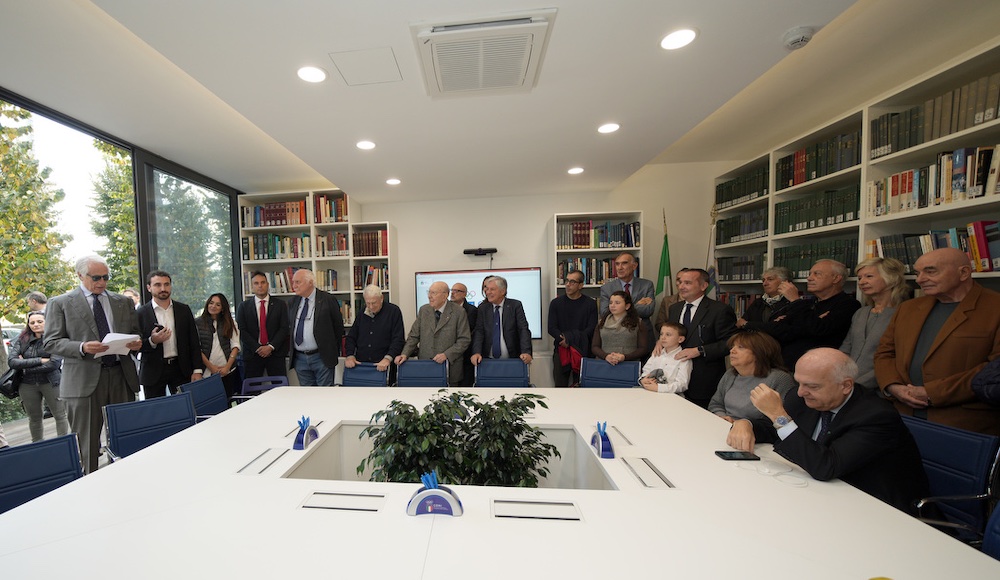
The Institute of Sports Medicine and Science turns 60, library named after Barbara Di Giacinto. Malagò: "Forever her place"
- IMSS CONI
The CONI Institute of Sports Medicine and Science celebrates 60 years. At the Acqua Acetosa Olympic Preparation Centre, the President of the Italian National Olympic Committee, Giovanni Malagò, celebrated the anniversary of the institute that was established on 6 November 1963 and is now named after Professor Antonio Venerando. The only CONI health and scientific facility on national soil, the IMSS, directed today by Giampiero Pastore, has the institutional task of protecting the health of elite athletes, providing the National Sports Federations with scientific knowledge for the improvement of sports performance in view of Olympic and high-level events, and promoting a sports culture aimed at ensuring individual well-being. "I am particularly happy to have with me former CONI president and honorary IOC member Franco Carraro, board member Paolo Pizzo and Olympic champion Elia Viviani," said President Giovanni Malagò. "Here at the Institute there is a long history of men, doctors, sports executives: not only me, but all of us are deeply grateful. In recent years, a new era of success, prestige, credibility and ambition has dawned." On the occasion of the 60th anniversary of the IMSS, the Library was named after Dr Barbara Di Giacinto, former director of the Institute of Sports Medicine, who passed away last March at the age of 46. "I am truly honoured to dedicate this room, at the heart of the Institute, to Barbara Di Giacinto," stressed Malagò. "I am happy to have her parents, husband and children here with us. Barbara looks down on us from above and will be happy today – this will remain her place for eternity." "Being here is a pleasure, everyone misses Barbara. At the Tokyo Olympics I experienced great emotions, I remember how she managed every little detail: today she is not here, but I feel her presence," said Elia Viviani. "With great emotion we all remember Professor Di Giacinto. Her children will carry on her memory," Franco Carraro remarked. "I would like to remember Giulio Onesti, whose legacy this all is – we are here thanks to him. And I thank all those who have worked for this Institute: the great results achieved by our athletes are due to the role of the Institute". "My life is tied to CONI through twelve Olympic Games and long periods spent with the Italian team. The joys outweigh the hard and difficult times, and for this I thank everyone," said Giorgio Santilli, Director of the Institute from 1984 to 1996. At the end of the ceremony, the Library plaque dedicated to Professor Di Giacinto was unveiled. "Barbara was at home here, it was her second family. She was proud and appreciative to be part of the world of sport: at home she told us about everything, she was very focused on her work. It's nice to know that she left such a big mark, translated into these expressions of affection and gratitude," said Vittorio, Barbara Di Giacinto's husband.
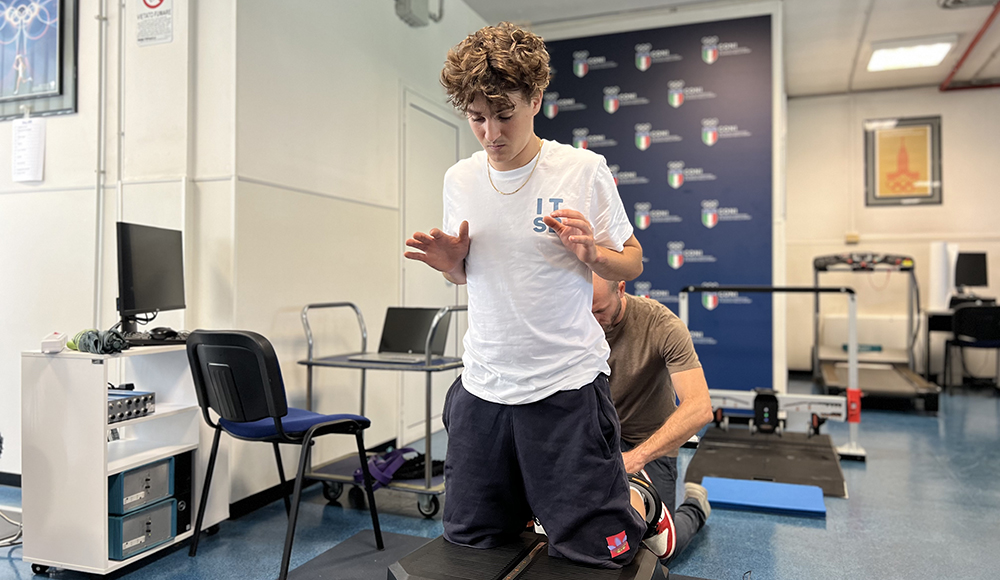
Skateboarding, test for Mazzara: "This time I want to arrive at the Olympic Games in top form
- IMSS CONI
In Tokyo 2020 he made his debut, in Paris 2024 he is keen to impress. At CONI's “Giulio Onesti” Olympic Preparation Centre in Rome, skater Alessandro Mazzara underwent a series of tests to monitor his training and assess the muscular strength of his lower limbs: the tests, carried out with the staff of CONI's Institute of Medicine and Sport Science, are fundamental for planning the activities of the coming months in view of the Olympic qualification events. “I started skateboarding by chance,” says the Italian. “I live near the Cinecittà Skate Park in Cinecittà, in Rome: one day my father took me there, I was six years old at the time, and I was fascinated. Since then I’ve never stopped.” 13 years later and his discipline has now become a genuine reality: “Today skateboarding is a sport in its own right. When I started I didn't have an athletic routine, but now I have a team of people who help me to perform at my best. I train in the gym in the morning and skate in the afternoon, or on some days I do two skate sessions. I have to follow a healthy lifestyle: eating well, going to bed early and much more besides.” Born in Erice, in the province of Trapani, Mazzara has always lived in the capital and is in his final year of an arts-focused secondary school. When skateboarding became part of the Olympic programme (it made its Olympic debut in Tokyo two years ago) his outlook changed: “I was at home having dinner with my mum and dad when we heard the news on television. My dad said ‘What an opportunity!’ And he wasn't just referring to me. This is a great chance for the whole movement, since this is a sport that has quite a low profile in Italy. I am happy that skate parks and skaters have increased in recent years. I realised for the first time that I could make a living from skateboarding. So I began a journey with my dad, who is a very sporty guy and above all is crazy like me (laughs, ed.). At a certain point, the Italian Federation of Roller Sports and CONI took over.” Luck was not on Alessandro’s side before the Olympic Games in Japan: “Two weeks before Tokyo 2020, I fractured my right elbow. An injury before such an important competition was difficult to come to terms with. Then somehow I recovered and participated, finishing 12th, in a special edition of the Games, locked away inside the Olympic Village and with tests carried out every day due to Covid. Everything will be much better in Paris.” The pass is not yet official, but the Italian has a very good chance of qualifying for the upcoming Olympics in the park speciality: “I am number 15 in the world and, considering that there will be a maximum of three athletes per nation in each speciality, some ahead of me will not be taken into account. To go to Paris I have to finish in the top 20 (the Olympic ranking closes on 24 June 2024, ed): I’m confident I can get there. My goal will then be to arrive at the event having prepared well and being able to rely 100% on my physical condition. My dream is winning a medal”.
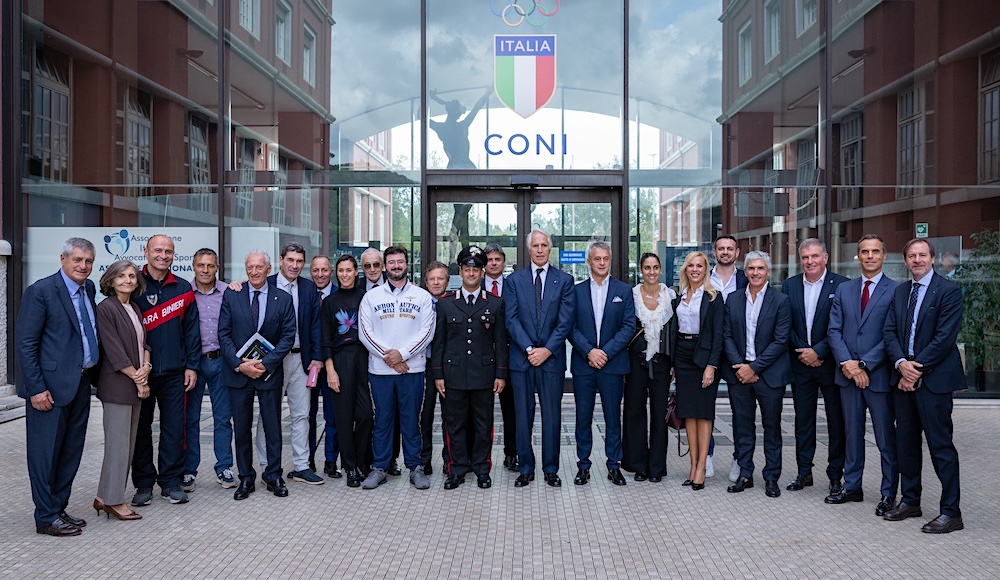
Twelve new champions enter the Walk of Fame
- AT THE FORO ITALICO
Eight new plaques for 12 great champions will enrich the Walk of Fame of Italian sport. At the Foro Italico, CONI President Giovanni Malagò, in the presence of Secretary General Carlo Mornati, Deputy Vice President Silvia Salis and Vice President Claudia Giordani, members of the Board and several federal presidents, unveiled the new tiles dedicated to Flavia Pennetta (tennis), Amedeo Pomilio (water polo), Giulia Quintavalle (judo), Marco Galiazzo (archery), Daniele Molmenti (canoeing), Antonio Tartaglia and Gunther Huber (bobsleigh), Carlo Molfetta (taekwondo) and the 4x10 km cross-country Olympians in Lillehammer 1994, Marco Albarello, Maurilio De Zolt, Silvio Fauner and Giorgio Vanzetta. "This is a wonderful recognition by CONI and the Italian sports movement," remarked an emotional Flavia Pennetta, queen of the US Open in 2015 and the first to unveil her plaque today, placed just a few metres from the Stadio dei Marmi. "In my career I have always tried to give my all for Italy, a small country that provides a lot of joy in sporting terms – and for this we must be proud." "In the year in which Parliament included sport in the Constitution," stressed Amedeo Pomilio, gold medallist with the Settebello at the 1992 Olympic Games in Barcelona, "to receive this recognition is the height of pride. To represent an example for the new generations is an honour and a duty." "It is truly a wonderful moment. I have made history in my sport as the first woman to win an Olympic gold medal in judo, and today I thank the Federation and President Malagò for this wonderful recognition," said Giulia Quintavalle, an Olympian in Beijing 2008. "I have few words to describe the joy of this plaque. Thank you very much, it is an honour," added Marco Galiazzo, the first Olympic champion in the history of Italian archery in Athens 2004, a success he later repeated with the team in London 2012. "This walk features the great names of Italian sport, an example of athleticism and fair play," remarked Daniele Molmenti, Olympic champion in K1 in London 2012 and today technical director of the Italian national slalom canoe team. "I would like to continue to be an example: with this Walk of Fame, young people can remember what we have done for Italian sport". There was also great emotion for Antonio Tartaglia and Gunther Huber, Olympians in the two-man bobsleigh in Nagano 1998. "We are truly honoured," Huber admitted. "Two years ago at the Foro Italico I was reading the names in the Walk of Fame," added Tartaglia. "Today I am here too and I hope to be able to continue to help our youngsters." Representing the cross-country skiing relay, protagonist in Lillehammer 1994 of "one of the greatest feats in the history of the sport in front of 200,000 people," as President Malagò recalled, were Marco Albarello and Silvio Fauner. "We went down in history, and today I want to thank them for this wonderful memory that I hope will remain in everyone's heart." "A special thanks to the President, it is an honour to be among great champions in this Walk of Fame. Sport has given me so much and I hope to be able to transmit the same values," Fauner said. Closing the ceremony was Carlo Molfetta, Olympic champion in taekwondo at London 2012. "You realise what you have done thanks to these awards, which allow you to remain part of history forever. Today I am really happy," admitted the current national taekwondo team manager.
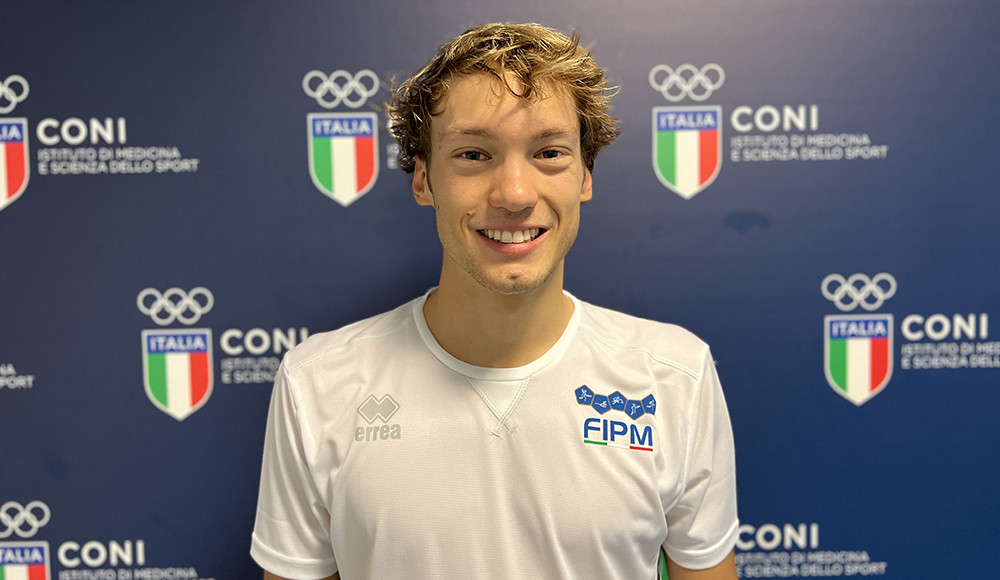
Modern pentathlon, test day for Malan: "I want to enjoy my first Olympic experience"
- IMSS CONI
At work for the new season, with Paris 2024 at the top of the list of events that require flawless preparation. Giorgio Malan, winner of the men's modern pentathlon competition at the European Games in Krakow on 1 July, today underwent a series of examinations by CONI's Institute of Medicine and Sport Science at the “Giulio Onesti'” centre in Rome, to plan out a season that will culminate in the French Olympic Games. Specifically, the Italian athlete – who won his first career Olympic pass by triumphing in Poland – underwent static and dynamic baropodometric studies and a biomechanical analysis of his running. These tests allow the athlete and his team to assess in detail certain parameters, such as load symmetry or vertical oscillation of the centre of gravity, in order to improve running efficiency. The tests were carried out with the technicians of the Institute of Sports Medicine and Science, in collaboration with the technical coordinator and FIPM Olympic team co-director Umberto Mazzini. “I feel good,” said Malan. “I have just started training again after the summer holidays: I like to work at a high pace but I know I have to take my time to get into top shape at the right time. In order to improve and perfect my performance, days like this are essential: I am very happy to be able to rely on the support of the Institute, its equipment and its extremely competent staff.” The emotions of Krakow are still vivid: “That day I fulfilled two dreams. I won the European Games and qualified for Paris 2024. An indescribable joy. After that success for a fortnight I felt like I was flying, I was walking on air. Managing that period was also an experience: after a great result it is normal to have a drop, but I know the importance of work and consistency and I still want to improve and win.” On the same day in Krakow, Italy's Alice Sotero triumphed in the women's event. Both she and reigning world champion Elena Micheli are also certain to participate in the Olympics in France. “The bar is always high for the Italian modern pentathlon,” Malan emphasises. “They are phenomenal, two sporting heavyweights. And Alice is from Asti, while I’m from Turin, in the same region: we see each other often and occasionally train together. Ever since I was a child, I have always liked to look at what the great champions do and take inspiration from them. They are two champions and really spur me on.” The 23-year-old from Piedmont is studying economics and management at university: “It's tough because I train in five sports and there are only 24 hours in the day (laughs, ed.). For the European Games I decided to set aside the summer exam session and the result justified my decision. Now that I have more time and there are no major competitions on the horizon, I will give it my all for the winter session.” He is crystal-clear about the preparation that is required: “To excel in the modern pentathlon you have to like all five disciplines we do. I am most strongest in athletics, running and swimming. I need to build my consistency in shooting and fencing.” In doing so, he can enjoy his dream of Paris 2024: “It will be my first Olympics, it will be a great thrill, but I don't want to think about it too much or get overwhelmed by the pressure. The goal will be to enjoy it, have fun, give my all and return home with no regrets”.
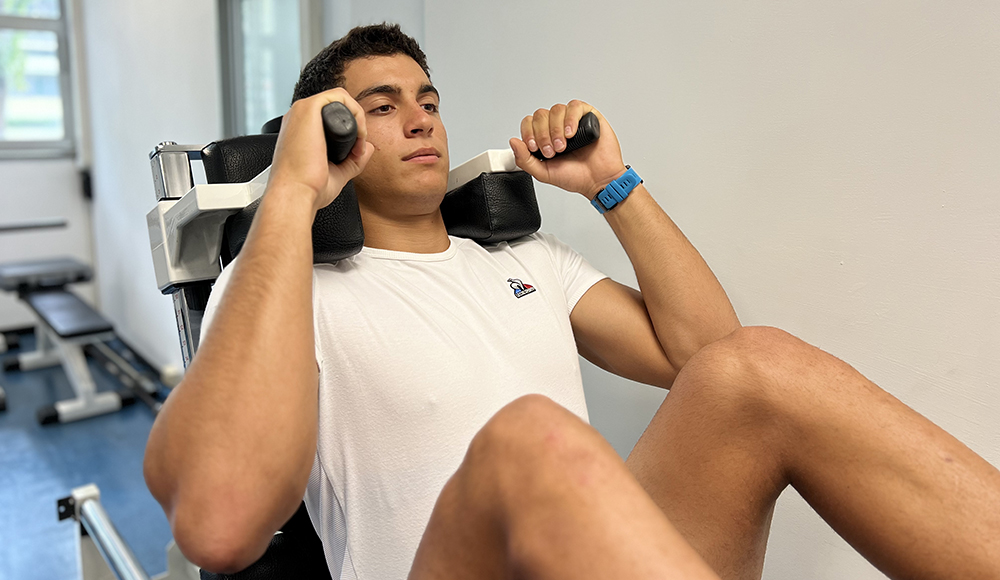
Italian sailors at the CPO in Rome for testing, Pianosi: "Paris 2024? I get a thrill just thinking about it"
- IMSS CONI
The perfect balance between talented youngsters and more experienced athletes with celebrated careers. The Italian sailors gathered at CONI’s “Giulio Onesti” Olympic Preparation Centre for the CONI Institute of Medicine and Sport Science tests. In Rome, Giacomo Ferrari, Mattia Cesana, Carolina Albano, Alessandra Dubbini, Chiara Benini Floriani, Giorgia della Valle, Caterina Banti, Silvia Zennaro, Alexandra Stalder, Sofia Tomasoni, Jana Germani, Giorgia Bertuzzi, Riccardo Pianosi, Maggie Eillen Pescetto, Lorenzo Boschetti, Giulio Calabrò, Uberto Crivelli Visconti, Silvia Speri, Nicolò Renna, Giorgia Speciale, Lorenzo Brando Chiavarini, Manolo Modena, Marta Maggetti, Dimitri Peroni, Luca Di Tomassi, Sofia Giunchiglia and Giulia Schio underwent tests to monitor physiological parameters and with overloads on the lower limbs and kinetic chain, as well as anthropometric evaluations to establish their neuromuscular and physiological profiles. In August, the Azzurri had a great World Championships in Holland, where they managed to win two medals and qualify seven boats for the Olympic Games. “I am very satisfied with my season, while also aware that I could have done even better,” explains Riccardo Pianosi, who in addition to securing a pass for Paris 2024 at the world championship event also became European kite champion. “In addition to the national place for the Games, at the World Championships I would also have liked to have been on the podium, but on the last day of the competition I made a mistake which meant I finished fifth. The Olympics? It is the dream of a lifetime; I get a thrill just thinking about it. I want to make it a reality.” Also on the podium at the European Championships won in September by Pianosi in Portsmouth, Great Britain, was Lorenzo Boschetti, who finished third. “I started the year a bit slow,” says the kiter from Cesenatico, “then I got going with the fourth place at the Olympic Test Event in Marseille (Marseille Marina will stage the sailing competitions for Paris 2024, ed.), and I understood what I had to improve on to take an important step forward. The European bronze medal is a great confirmation of my ability in many ways. And the second place in the World Cup in Cagliari last week gives me even more confidence. I had a very good end to the season.” Only one of Boschetti and Pianosi will go to the Games next year: “All children who do sport with the ambition to achieve certain results dream of the Olympics. Just to be part of the national team and to be supported by CONI is a huge opportunity for me: I am already focused on the goal of participating in Paris 2024, I wake up every morning with the desire to go there and do well.” In the women's field, the competitor who secured the national spot for the Olympics in the kite was Maggie Eillen Pescetto: “I was born in Ireland but have always lived in Genoa. My dad is a sailor, my grandfather is a sailor and in general, taking into account our love for rugby, we are a family of sportsmen. When I was 13 I started kitesurfing with the aim of participating in the Youth Olympic Games (Buenos Aires 2018, ed), but I missed out.” Then came the turning point: “In 2019 the Federation introduced us to kitefoil, a new Olympic discipline. When I tried it I fell in love immediately: I like the speed, the fact that it doesn't all happen in three minutes but that everything is more thought out, studied. I like the way the races are run and I love the feeling I get on the board. There is still a lot to work on,” Pescetto continues, “but the great satisfaction of qualifying for Paris 2024 remains. It is very emotional to go back over the steps taken in these few years. We’ve got to keep pushing ourselves so we get to the Olympics in top form.” In this mission the relationship with CONI's Institute of Sports Medicine and Science is a big help: “We are happy that we can check on several parameters each year. It is essential to know how we are doing from a complete perspective: in this way we can set new benchmarks for training”.
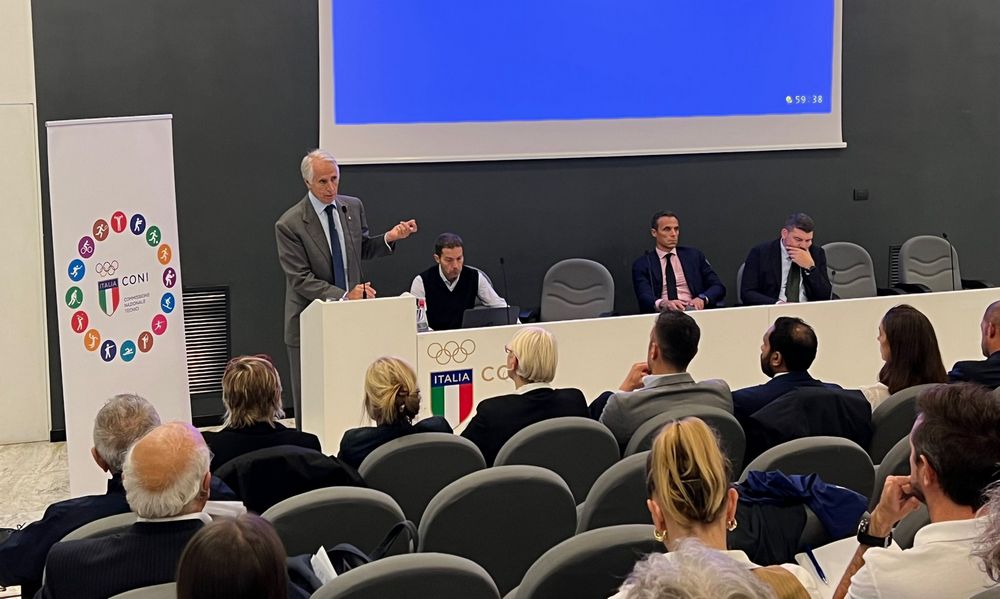
National Technical Commission in assembly at Onesti Olympic Preparation Centre, Malagò: "Incredible results, let's keep fighting"
- CONI
Getting to know one another and comparing notes in order to grow together, taking into account the differences between the various disciplines but with the common goal of raising the profile of Italian sport. The Aula Magna of the CONI “Giulio Onesti” Olympic Preparation Centre in Rome hosted the Assembly of the CONI National Technical Commission. It was a valuable opportunity to exchange ideas, methodologies, and principles with esteemed experts in the field, all united under the Italian flag. CONI President Giovanni Malagò opened the meeting: “We are in the heart of the highest sporting level. In this Centre athletes sleep, eat, train and study. Here, there are the athletes who represent our country, CONI, the Italia Team. And here Medicine and Science are deeply connected.” There followed a reference to the activities of the Olympic Committee: “A few years ago, CONI was responsible for organising the Olympic Games, the Mediterranean Games – and little else. Now we are perpetually campaigning to support these activities: the Youth Olympic Games have arrived, there are also the European events, which are of great value – sometimes even for Olympic qualification. And at continental level there are new youth events too. Our structure is under a lot of stress, but we continue to operate with a smile. We are used to improving, to perfecting our activities. The results of the last few years,” concluded Malagò, “encompassing the Olympic Games and the World and European Championships, have been sensational. Once again this year we are by far the best in Europe. But this situation will not go on for long: we are closed in many regards, most notably from a demographic aspect. We get little help from schools. We have three things in our favour: amateur sports associations and clubs; coaches and their skills; our Olympic Preparation. We have to defend our resources tooth and nail. The bar is always higher. Amateur clubs are not supported and the latest decrees do not help coaches. We must continue the fight.” Next up was Carlo Mornati, Secretary General of CONI, who emphasised that events like today's will not be one-offs: “Congratulations to the Technical Commission. These are opportunities for exchanging views that have a goal: to bring the technical managers of the federations closer together by osmosis. Relationships are created, ideas are exchanged, people get to know each other. In this way we can all do well at the multidisciplinary events we face. The goal is to start again with a single school, retracing what Giulio Onesti did: we want to spread knowledge and culture together with you, there will be a scientific strand and a managerial strand”. Proud and determined, Orazio Arancio, President of the Steering Committee of the CONI National Technical Commission, then spoke: “Our intention is to give coaches a new centrality that must go beyond the athlete.” His words were endorsed by Cecilia D'Angelo, Head of the CONI Territorial Directorate,: “Coaches hold the fate of a large part of Italian sport in their hands. You are educators, trainers and coaches. You have great responsibility, and year after year you continue to professionalise. We want to train new young coaches, as well as new young athletes, and, to this end, integration between disciplines is fundamental. And we have to get young people enthusiastic about sport. As far as schools are concerned, we have resumed the relationship with coaches and have asked the federations for a tailor-made training plan for local areas. Regional schools must provide this service. CONI Centres, Educamp and the Trofeo CONI are fundamental events for youngsters. Let us work for the development of future sport.” Kelum Perera, Secretary of the Italian Cricket Federation and member of the CONI National Council in a coaching quota role, spoke about the training and skills of coaches: “Today's world moves at the speed of light. Staying up-to-date and doing training is crucial to develop skills. Today, being a coach also means having other skills beyond the purely technical. New technologies and tools support us. We must have communication skills, know-how to solve problems, be a leader, adapt to change and have ethical and professional skills. And we need to study.” Then it was the turn of the former Olympic athletes, starting with Giulia Quintavalle, judo Olympic medallist and member of the CONI National Council in a coaching quota role, who focused on youth sport: “Athletic development contributes to enriching a young athlete's movement, coordination and cognitive skills, taking into account factors such as biological age, individual growth and the risk of childhood diseases. Early specialisation prevents continuous growth: it is only necessary during a second phase of an athlete's training”. She was followed by Valentina Turisini, Olympic silver medallist and shooting coach, Vice President of the Steering Committee of the CONI National Technical Commission and a CONI national advisor. Her speech focused on the presence of women in the technical arena: “In Paris 2024 there will be gender parity for athletes, but women should also be represented at other levels of leadership. Women train almost exclusively other women, youngsters and children: this is the situation in Europe and Italy. To change things we need men to contribute. Together we can do it.” And Daniele Molmenti, Olympic medallist and now technical director of the National Slalom Canoe Team, as well as a member of the CONI National Technical Commission, added: "Why could a top athlete become a good coach? Primarily due to their extensive competitive experience and familiarity with challenges. The social aspect is also relevant: a former champion generates movement, attraction, interest. The cultural aspect is also significant: someone who goes from performing to educating must study. And from the economic point of view, a champion who becomes a coach provides the maximum return on the investment made by the federation and those who invested in their career.” Daniela Isetti, a member of the Executive Board of the International Cycling Union and of the Steering Committee of the CONI National Technical Commission, focused instead on the social value of sport: “As coaches we are educators, with a great responsibility towards youngsters. Sport and inclusion complement and drive each other.” Prof. Valter Borellini and Prof. Nicola Setti, on the other hand, presented the multimedia project “Coach-Parent Relationship Guide: the Relationship with Parents 2.0”, divided into video snippets, each lasting approximately 15 minutes. These resources are accessible to the Steering Committee of the National Technical Commission for all Italian sports coaches. They aim to offer ideas, methods, and tools for establishing effective relational and partnership processes with parents, thereby contributing to the development of athletes across various levels and age groups. In closing, Andrea Mancino, President of the Italian Billiard and Bowling Federation and President of the CONI Fiscal Commission, addressed the issue of the impact of the sports labour reform on the role of the coach.
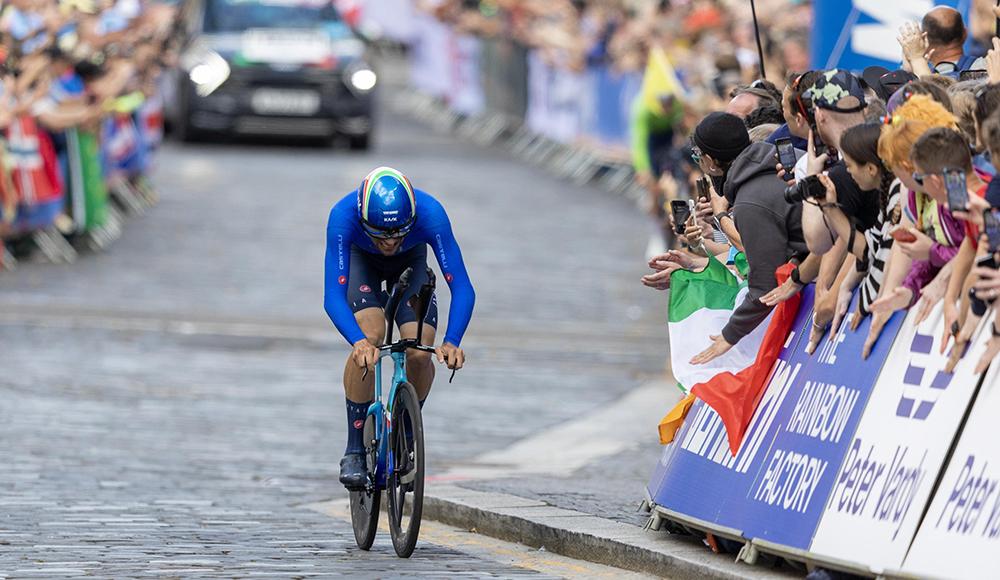
UCI ranking closed, Italia Team wins seven Olympic quotas spots. Clean sweep for women: 4 at Paris 2024
- ROAD CYCLING
Four women and three men. With the unveiling of the nations' ranking by the Union Cycliste Internationale (UCI), the composition of the Italia Team contingent for road cycling at the Paris 2024 Olympic Games has been outlined. As of the final ranking set for 17 October, the Italian men's cycling team holds the eighth position in the standings with 11621.9 points. This achievement secures three Olympic slots for the road race, allocated to nations placed between 6th and 10th. Additionally, Italy can field two cyclists in the time trial event in Paris, courtesy of Filippo Ganna's (photo ANSA) second-place finish in the Glasgow 2023 World Championships, the highest-ranking Italian cyclist (15th spot with 2877 points). Meanwhile, all four country quotas available were secured by the Italian women's national team for the road race, placing second with 8456.1 points, surpassed only by the Netherlands. The Italian women's team, led by the top-ranked Silvia Persico (10th with 1933.81 points), also clinched a spot in the women's time trial for Paris 2024. The qualification criteria dictate that nations ranked between 1st and 5th receive four Olympic cards for the road race. Those positioned between 6th and 10th secure three cards, while countries ranked between 11th and 20th are granted two cards. Additionally, one card is awarded to nations placed between 21st and 45th. As France has already won the quotas through the UCI World Ranking by Nations of 17 October, the two quotas per gender reserved for the host country will be reallocated to the best nations above 45th place (with a maximum of one per NOC). By 15 November, the UCI will inform the respective National Olympic Committees and National Federations of the allocated quotas. The NOCs will then have until 15 December to confirm to the UCI whether they wish to take up these quota places. Any unused quotas will be reallocated according to the UCI World Ranking of Nations of 17 October.
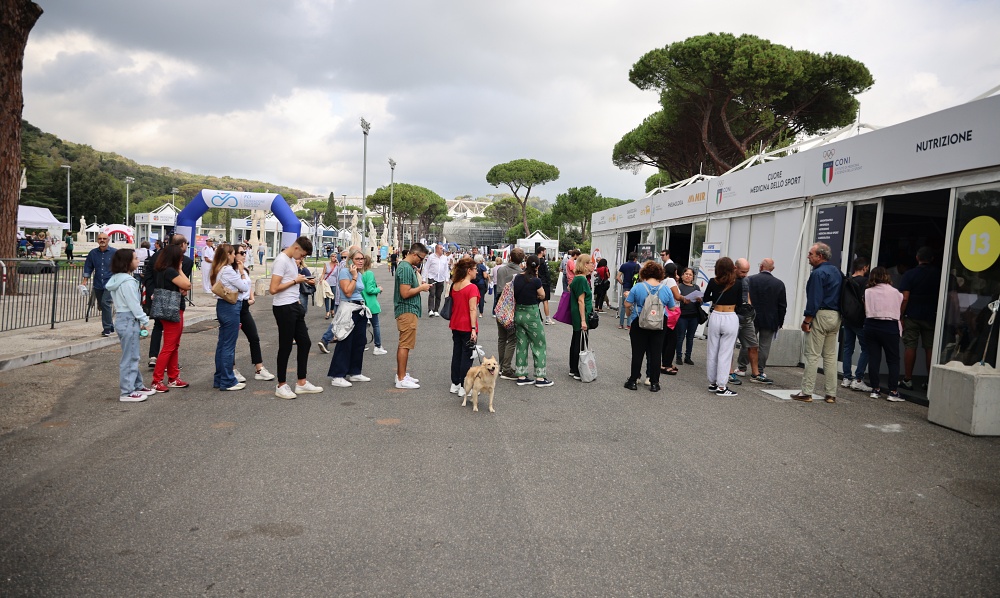
Record edition for Tennis & Friends 2023; 300 free screenings at the Institute of Sports Medicine and Science
- CONI
The 13th edition of “Tennis & Friends – Salute e Sport (Health and Sport)”, the event aiming to raise awareness of the importance of preventive healthcare, ended yesterday with a record turnout. The focus of the 2023 edition, entitled “La Prevenzione è GIOVANE (Prevention is YOUNG”', was on youngsters. And it was the youngest, with their families, who crowded the stands at the Foro Italico over the weekend. There were around 80,000 attendees and almost 30,000 free screenings and clinical consultations were offered. There was also significant interest in the CONI Institute of Sports Medicine and Science, in attendance with five spaces dedicated to Sports Medicine, Orthopaedics, Dentistry, Nutrition and Sports Science. The queue at the entrance to the CONI area (photo Tennis & Friends) did not deter those present, who were able to benefit from approximately 300 free screenings spread over the two days of visits. Among the most popular were orthopaedic and sports medicine and science consultations (accounting for around 70% of the services offered by CONI at the Foro Italico). Supporting the Institute were Italian Team champions Daniele Garozzo (fencing), Margherita Panziera (swimming), Domitilla Picozzi (water polo) and Simone Alessio (taekwondo), who attended on Saturday at the opening ceremony alongside CONI Secretary General Carlo Mornati. CONI's Institute of Sports Medicine and Science was present, alongside Head Giampiero Pastore, Health Director, Professor Andrea Ferretti, and Dr. Maria Rosaria Squeo, Health Director of the Olympic Area. The screenings were carried out by the following specialists: Maria Rosa Squeo, Roberto Fiore, Andrea Serdoz, Ilaria Menichini, Domenico Zampaglione, Alessandro Spinelli (Sports Medicine), Andrea Ferretti, Matteo Guzzini, Federica Alviti, Gabriele Bolle, Alessandro Carrozzo (Orthopaedics), Angelica Petrilli, Simona Maratea, Andrea Roiate, Chiara Bellisari, Daniele Puzzilli, Simona Maratea, Edoardo Montemurro, Silvia De Nigris (Dentistry), Loredana Torrisi, Giulia Rossato, Alessio Franco, Lucre Lucrezia Macori (Nutrition) and Dario Dalla Vedova, Nicolò Brigati, Valentina Becchi, Antonio Indelicato, Chiara Ragona, Cristian Romagnoli, Francesca Ambruoso and Valerio Carlozzi (Sport Science).
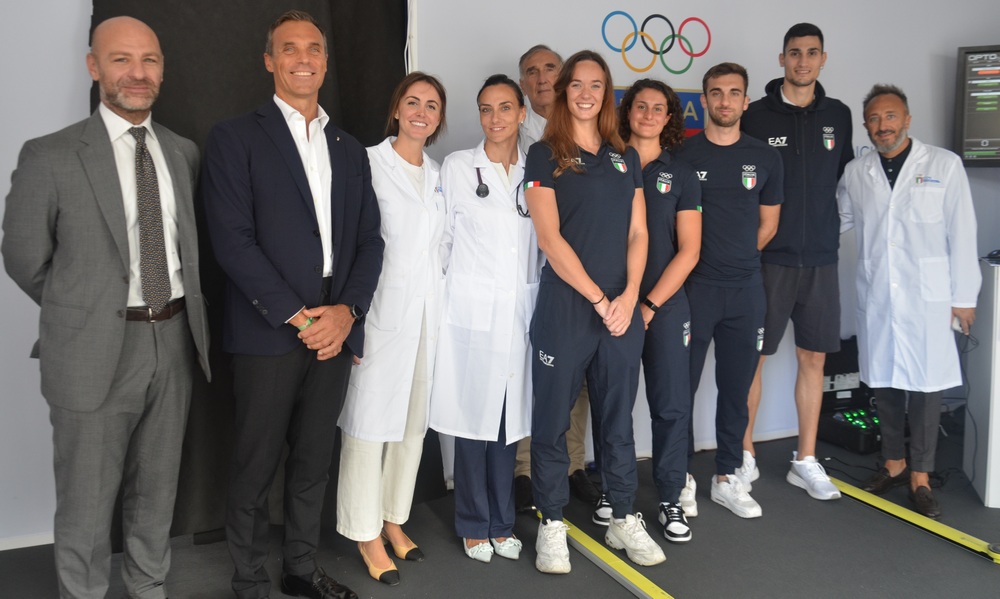
The Institute of Sports Medicine and Science at Tennis & Friends 2023. Mornati: "We are pioneers at high-level prevention"
- CONI
Sports, entertainment and promotion of healthy lifestyles. "Tennis & Friends – Salute e Sport (Health and Sport)" returns to the Foro Italico and CONI is there with its Institute of Sports Medicine and Science. The ribbon-cutting ceremony of the event, which in 12 years has provided more than 200,000 free screenings, was attended by the Secretary General of the Italian National Olympic Committee, Carlo Mornati, along with, among others, Health Minister Orazio Schillaci, the Mayor of Rome, Roberto Gualtieri, the Head of the Department for Sport, Flavio Siniscalchi, the President of Sport and Health Marco Mezzaroma and the creator of the event, Giorgio Meneschincheri, President of the non-profit organisation Friends for Health and Professor at the Università Cattolica del Sacro Cuore in Rome. Meanwhile, Italia Team “fielded” Olympic fencing champion Daniele Garozzo and top athletes in swimming, water polo and taekwondo – Margherita Panziera, Domitilla Picozzi and Simone Alessio. The 2023 edition is entitled “La prevenzione è GIOVANE (Prevention is YOUNG)” and is aimed in particular at youngsters, the main target group of the initiative, which, today and tomorrow, also brings together numerous National Sports Federations at the Sports Village. "We are extremely pleased to be included under the auspices of Sports Medicine, in which we feel like pioneers, since our Institute was founded in 1963," said Mornati, "and the Italian Sports Medicine Federation has been part of our great family since 1929. When it comes to talking about sports and health, we’re on our home turf. We must thank Giorgio from a cultural perspective for this initiative, because 12 years ago we were here in a different capacity with a tournament stand, while today we are here on this stage. This cultural dissemination also allows us, who are at the top of the sports pyramid, to fulfil, in the best way possible, our statutory missions and those of the IOC. Article 27 states that the task of the National Olympic Committees is to promote the medical care and health of athletes. Today we are here with four Olympic athletes – Margherita Panziera, Domitilla Picozzi, Simone Alessio, and Daniele Garozzo," he added. "These youngsters will be involved in the next Olympic Games, they are the pride of Italy, and they arrive at the Games after a screening, as so many are doing today. If they don't pass the screening at the Institute of Sports Medicine they don't go to the Olympics – it is the best form of high-level prevention. I thank Giorgio because he is able to translate this high-level work to mass outreach on the ground in what is a very important statutory mission for us.” CONI's Institute of Sports Medicine and Science – with Head Giampiero Pastore, Health Director Professor Andrea Ferretti and Dr. Maria Rosaria Squeo, Health Officer of the Olympic Area – is in attendance with five spaces dedicated to Sports Medicine, Orthopaedics, Dentistry, Nutrition and Sports Science, with free screenings offered by the Institute's specialists: Maria Rosa Squeo, Roberto Fiore, Andrea Serdoz, Ilaria Menichini, Domenico Zampaglione, Alessandro Spinelli (Sports Medicine), Andrea Ferretti, Matteo Guzzini, Federica Alviti, Gabriele Bolle, Alessandro Carrozzo (Orthopaedics), Angelica Petrilli, Simona Maratea, Andrea Roiate, Chiara Bellisari, Daniele Puzzilli, Simona Maratea, Edoardo Montemurro, Silvia De Nigris (Dentistry), Loredana Torrisi, Giulia Rossato, Alessio Franco, Lucre Lucrezia Macori (Nutrition) and Dario Dalla Vedova, Nicolò Brigati, Valentina Becchi, Antonio Indelicato, Chiara Ragona, Cristian Romagnoli, Francesca Ambruoso and Valerio Carlozzi (Sport Science).
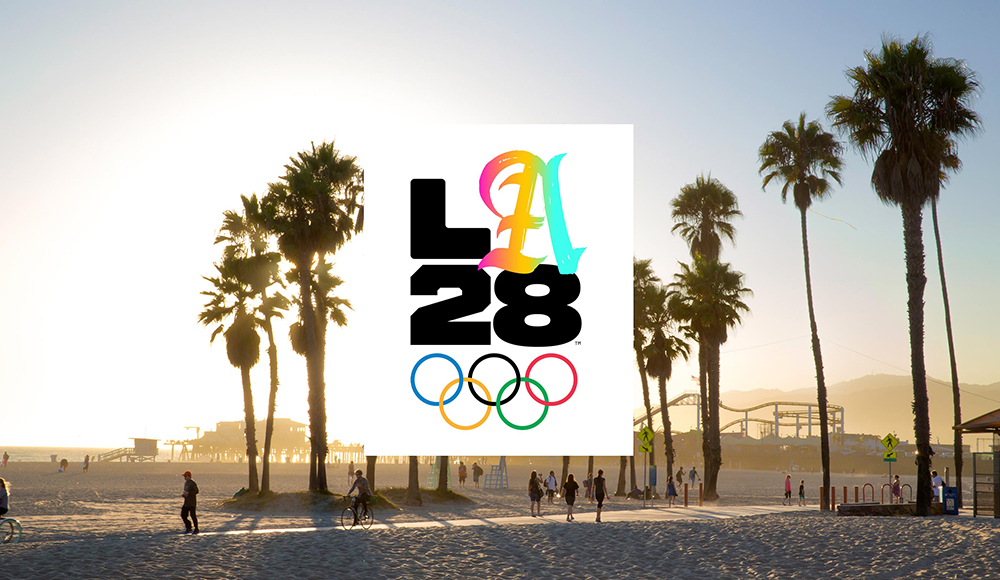
IOC EB puts forward LA28’s additional sports proposal to the IOC Session
- OLYMPICS
Baseball/softball, cricket (T20), flag football, lacrosse (sixes) and squash are the five sports submitted by the International Olympic Committee (IOC)’s Executive Board (EB) to the upcoming IOC Session as additional sports for the Olympic Games Los Angeles 2028 (LA28). These additional sports were proposed by the LA28 Organising Committee, for its edition of the Games only, and were reviewed by the Olympic Programme Commission (OPC) before being put forward to the EB.
For baseball/softball, cricket and lacrosse it would be a return to the Olympic Games, while flag football and squash would be making their Olympic debut in LA.
“The choice of these five new sports is in line with the American sports culture and will showcase iconic American sports to the world, while bringing international sports to the United States. These sports will make the Olympic Games LA28 unique,” said IOC President Thomas Bach. “Their inclusion will allow the Olympic Movement to engage with new athlete and fan communities in the US and globally.”
This selection of sports is the result of a thorough process and analysis based on evaluation criteria set out before the process began, including gender equality. It considered the utilisation of existing facilities, involving a wide range of sports communities both in the United States and globally, and incorporating some of the most popular sports in the United States and across the globe.
Baseball and softball
Baseball and softball have been part of the programme at several editions of the Olympic Games, most recently at Tokyo 2020. They are among some of the most iconic American sports, while four continents are represented in the world ranking top 10. The recent 2023 World Baseball Classic also set a tournament attendance record, with over 1 million spectators. Baseball and softball both have significant popularity among young people in the United States: baseball has the second highest domestic youth participation, with approximately 2.2 million young participants (aged 13-17), whilst softball features in the top five most popular high school sports for girls in the country.
Cricket
Part of the Olympic Games programme at Paris 1900, cricket has more than 2.5 billion fans worldwide and represents an invaluable opportunity to engage with new countries and communities, including the growing Indian community in the US. Cricket brings a vast social media following, the men’s 2024 Cricket T20 World Cup will be hosted in the USA, and a new major professional league, Major League Cricket, was recently launched in the USA. T20 – with a men’s and a women’s tournament – is the format that would be played at LA28.
Flag football
American football is the most popular sport in the US, and flag football, which would be making its Olympic debut at LA28, is growing fast both domestically and internationally. More children aged 6-12 play flag football than tackle football in the US and, at the elite level, there are approximately 20 million flag football players across over 100 countries, with gender-balanced athlete participation.
Lacrosse
Lacrosse was created by the Indigenous Peoples of North America and started to spread internationally in the 19th century, initially to Great Britain and Australia. Its potential inclusion on the LA28 sports programme (with the sixes format) would be its third appearance at the Olympic Games, after Saint Louis 1904 and London 1908. Its presence at LA28 would provide a unique opportunity to connect its North American heritage with its growing youth appeal. Lacrosse is experiencing tremendous development both in the US and globally, with four continents represented in the world ranking top 10.
Squash
Squash (singles) would be making its Olympic debut at LA28. It is already included in eight other multi-sport events, with four continents represented in the world ranking top 10. The sport has enjoyed spectacular growth over the last few years, especially among young people, with an 87 per cent increase in squash participation between 2015 and 2019 in the United States.
Boxing, modern pentathlon and weightlifting
The IOC EB also reviewed the status of three sports which were not part of the initial sports programme (boxing, modern pentathlon and weightlifting) following the decision by the IOC Session in February 2022 to approve the inclusion of 28 sports on the initial sports programme of the Olympic Games LA28.
The IOC EB recommendation at the time did not propose the inclusion of boxing, modern pentathlon and weightlifting, but rather provided a pathway for the potential inclusion of these three sports to allow the necessary time for the relevant International Federations (IFs) to address their respective individual circumstances and the criteria set by the IOC EB for inclusion.
Today, the IOC EB has taken the following decisions:
- Boxing: Following the IOC Session’s decision to withdraw the recognition of the International Boxing Association (IBA), the IOC has not recognised another governing body for Olympic boxing. Therefore, any decision regarding the inclusion of boxing on the LA28 sports programme is put on hold.
- Modern pentathlon: The IOC EB recommends its inclusion on the LA28 sports programme, acknowledging the replacement of horse riding with obstacle racing and the optimisation work conducted by the International Modern Pentathlon Union (UIPM) to reduce costs and complexity. The IOC EB noted that it is essential for the UIPM to continue to implement the necessary changes in governance and modernise as an organisation. Without the replacement of horse riding with obstacle racing, the sport would not have been included in the programme.
- Weightlifting: The IOC EB recommends its inclusion on the LA28 sports programme following the decision by the International Weightlifting Federation (IWF) to delegate its anti-doping management to the International Testing Agency (ITA) and its sanctioning to the Court of Arbitration for Sport (CAS) at least until the end of 2028. The effectiveness of the anti-doping programmes for the Paris 2024 Olympic qualification and Olympic competition will continue to be closely monitored by the IOC, as will the implementation of the governance and cultural changes adopted by the IWF.
LA28 discipline programme
The LA28 discipline programme has been finalised by the IOC EB and will not require any approval by the IOC Session.
Like the other decisions, it was based on the recommendations of the OPC. The OPC undertook a full review in the context of the Los Angeles 2028 programme principles approved by the IOC EB in April 2022, reflecting the Olympic Charter, the recommendations of Olympic Agenda 2020+5, and both the IOC’s and LA28’s vision for the Games.
Overall, the discipline review highlighted various opportunities that exist for the IOC, LA28 and the IFs to work together to reduce the cost and complexity of the sports programme at the Games.
Following a holistic review of all existing and new disciplines proposed by the respective IFs with sports on the LA28 programme, only one change has been made to the discipline programme compared to Paris 2024, with beach sprint rowing, a format of the coastal rowing discipline, included on the Olympic programme for the first time. It will replace the lightweight double sculls (men 2x and women 2x) events. The inclusion of beach sprint rowing is the outcome of a decade-long development of coastal rowing with the active support of rowing communities across the world. The new discipline will share an existing Games venue, to be determined, with another sport.
A critical consideration in the discipline review was maximising venue-sharing opportunities and leveraging existing, world-class venues and infrastructure in LA and the US. This will be reflected in the LA28 venue master plan.
The programme of events and athlete quotas will be finalised after Paris 2024. The OPC will now work on ensuring that the final athlete quota numbers for the Olympic Games LA28 remain reasonable and below the overall quota for Tokyo 2020.
Page 20 of 126


